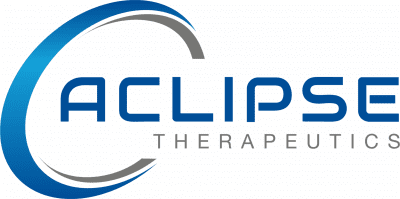
Aclipse Therapeutics Announces $1.475 Million Award from the US Department of Defense
Funding Supports Aclipse Therapeutics’ and Sheffield Institute of Translational Neuroscience’s Continued Development of M102 in Amyotrophic Lateral Sclerosis
RADNOR, Pa.–(BUSINESS WIRE)–April 20, 2022--Aclipse Therapeutics and its subsidiary Aclipse One Inc (“Aclipse” or “the Company”), an innovative biopharmaceutical company, today announced that the Company has received a therapeutic development award of $1.475 million from the Congressionally Directed Medical Research Programs (CDMRP) at the United States Department of Defense’s (DOD) U.S. Army Medical Research and Development Command (USAMRDC), as part of its FY21 Amyotrophic Lateral Sclerosis Research Program (ALSRP) Therapeutic Development Award. The award will fund the research by the Company and its collaborator, the Sheffield Institute for Translational Neuroscience (SITraN) at the University of Sheffield in the United Kingdom (UK) entitled, “Development of M102 to Investigational New Drug (IND) Stage for Initiation of Phase I Clinical Trials for Treating Amyotrophic Lateral Sclerosis (ALS).”
M102 is Aclipse’s potentially disease-modifying drug candidate that has shown promise in impeding the progression of ALS — also known as motor neuron disease (MND) or Lou Gehrig’s disease — in a wide variety of preclinical models. ALS is highly relevant to the health of military service members and veterans, given that, since September 2001, more U.S. veterans have died from ALS (an estimated 9,500 to 10,000 deaths) than from U.S. combat deaths in Iraq and Afghanistan, combined.1 Currently, there is no cure for the disease, and there are limited treatments to halt or slow its progression.
Aclipse is taking a dual mechanisms of disease approach to the treatment of ALS. Specifically, M102 activates the NRF2 (nuclear factor erythroid 2-related factor 2) and HSF1 (Heat shock factor 1) signaling pathways, which are understood to impact ALS pathophysiology. Based on preclinical results, to date, M102 is expected to be mechanistically superior to currently available drugs and may lead to significant slowing of disease progression in patients with both familial and sporadic ALS.
“This development funding is wonderful news for ALS/MND patients who are in urgent need of effective therapies to address this life-threatening neurodegenerative disease,” stated Professor Dame Pamela Shaw, M.D., Director of SITraN and a primary contributor to M102’s development program. “Along with my SITraN colleagues and co-principal investigators, Professor Laura Ferraiuolo and Dr. Richard Mead, we spearheaded the ALS/MND biology research that led to the identification and development of M102, including the discovery of a potential precision medicine approach for M102. This funding will allow our team to expand development of M102’s precision medicine research and drive M102 into a Phase 1 trial. We are very excited and appreciative of the funding support.”
“I believe that the award reflects the DOD’s appreciation of the significance of ALS to the military and their belief in our unique M102 drug candidate and approach to treating ALS patients. We are very grateful for their support,” said Raymond K. Houck, Chief Executive Officer of Aclipse Therapeutics.
“This latest award, combined with ongoing financial backing from Australia’s FightMND and the United Kingdom’s Medical Research Council, is allowing our team to accelerate the development of M102 toward first-in-human clinical studies, which are expected to initiate in 2023, and further validates M102’s novel biology and our precision medicine approach,” said Dr. Ning Shan, Chief Scientific Officer of Aclipse Therapeutics and the award’s principal investigator.
This work was supported by the Office of the Assistant Secretary of Defense for Health Affairs endorsed by the Department of Defense, through the Amyotrophic Lateral Sclerosis Research Program, in the amount of $1,475,101, under Award No. W81XWH2210175. Opinions, interpretations, conclusions and recommendations are those of the author and are not necessarily endorsed by the Department of Defense.
About ALS/MND
Amyotrophic lateral sclerosis (ALS), also known as motor neuron disease (MND) or Lou Gehrig’s disease, is a progressive neurodegenerative disease that affects motor neurons (nerve cells) in the brain and the spinal cord. Eventually, people with ALS lose the ability to initiate and control muscle movement, which often leads to total paralysis and death within two to five years of diagnosis. There is no cure and limited life-prolonging treatments for the disease. Based on U.S. population studies, approximately 5,600 people in the U.S. are diagnosed with ALS each year and as many as 25,000 Americans and 5,000 UK citizens have the disease at any given time.
About the FY21 Amyotrophic Lateral Sclerosis Research Program Therapeutic Development Award.2
The Fiscal Year 2021 (FY21) Amyotrophic Lateral Sclerosis Research Program (ALSRP) supports innovative and high-impact research into the development of effective treatments for Amyotrophic Lateral Sclerosis. The U.S. Army Medical Research Acquisition Activity, 820 Chandler Street, Fort Detrick MD 21702-5014 is the awarding and administering acquisition office. The ALSRP was initiated in 2007 to provide support for research of exceptional scientific merit.
About the Sheffield Institute for Translational Neuroscience
The Sheffield Institute for Translational Neuroscience (SITraN), at the University of Sheffield in the United Kingdom, is an international center of excellence recognized for its ground-breaking work in the fight against motor neuron disease and other common neurodegenerative disorders. SITraN brings together 300 researchers in multi-disciplinary teams with state-of-the-art laboratories and equipment to study neurological illness. The center is unique in its design to unite clinicians and multidisciplinary teams of scientists to translate discoveries in basic neuroscience into benefits for patients. The SITraN teams have developed a robust portfolio of model systems to facilitate our understanding of disease mechanisms and identify new targets for therapeutic intervention which can be tested in our NIHR Sheffield Biomedical Research Centre experimental medicine programs. The work of SITraN is a major pillar of the University of Sheffield’s cross-faculty Neuroscience Institute, one of four flagship research institutes launched in 2019 to tackle the biggest global challenges through pioneering real-world solutions and involving more than 120 principal investigators from the Faculties of Medicine, Science and Engineering.
About Aclipse Therapeutics
Aclipse Therapeutics is an innovative biopharmaceutical company that develops novel and differentiated drugs to treat diseases with significant unmet medical needs. M102 is a dual Nrf2/HSF1 activator for the treatment of ALS and other neurodegenerative diseases. M102 uses a precision medicine approach to identify those ALS patients who are most likely to benefit from the drug. Aclipse has an experienced drug development team and a clinical advisory board of key opinion leaders in ALS. For more information about Aclipse Therapeutics, visit the website at https://www.aclipsetherapeutics.com or email [email protected].
- About the Author
- Latest Posts
BioBuzz is a community led, experience focused, biotech and life sciences media and events company. BioBuzz highlights regional breaking news, industry professionals, jobs, events, and resources for business and career growth. Their weekly newsletter is subscribed to by thousands in the BioHealth Capital Region and Greater Philadelphia as the go-to for industry updates.




